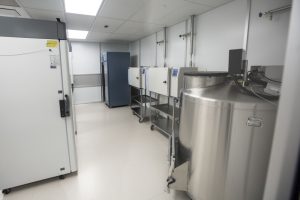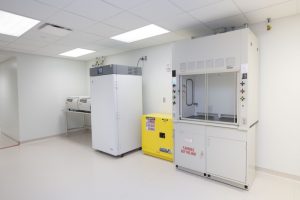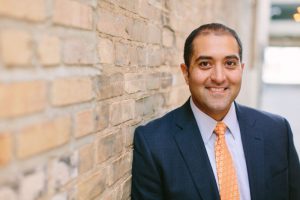Advanced Product Incubator — Mayo enters medical-grade product manufacturing space
Mayo Clinic has a new manufacturing facility — the Advanced Product Incubator — capable of producing medical-grade products for regenerative medicine applications.
The Advanced Product Incubator, part of the Center for Regenerative Medicine, focuses on cell-free biologic products that use cell-signaling factors (natural processes in the body that tell it how to heal), bio-potentiated gels, extracellular vesicles, nanoparticles and other solutions.
Products in the works include:
- A lubricant to help a tendon slide better after orthopedic surgery. After surgical replacement, tendons tend to lack adequate natural lubrication and the ability to glide well through joints and surrounding tissue. Adding a long-lasting lubricant improves ease and longevity of movement.
- A biologics-based therapy capable of protecting heart tissue after restoration of blood flow at the time of heart attack. This therapy helps to create a healthy profile of cell signaling in heart attack survivors and limit devastating injury.
- A wound-healing gel that uses natural regenerative signaling from the human body known as cytokines and chemokines to jumpstart the normal healing process. The product is slated to be tested in pressure ulcers, and vascular and diabetic wounds.
The incubator opened in mid-2015 to accelerate the discovery, translation and application of novel regenerative products.
“We work with physicians and scientists who have regenerative medicine ideas to help patients, and develop and manufacture acellular products to meet those needs,” says Atta Behfar, M.D., Ph.D. (MDPD ’06, MPET ’06, I ’09, CI ’11, CV ’13), Division of Cardiovascular Diseases and medical director of the Advanced Product Incubator at Mayo Clinic. “We do that by identifying key cell messengers — cytokines and chemokines within extracellular vesicles — and creating treatments from cells to induce the body to heal. Our products may be biologics or device-based, but they don’t include the use of live cells.
“Cells take significant time and labor to grow. The incubator’s strategy is to create low-cost point-of-care treatments that do not need to be individualized for each patient. [Mayo’s Human Cellular Therapy Laboratory (see below) provides personalized cell-therapy solutions.]”
Significant need for solutions
Manufacturing pharmaceutical solutions the traditional way is painstaking and very costly. It typically takes 10 to 14 years and $1 billion to produce a new pharmaceutical. But solutions are needed now.
Aging baby boomers have many health needs that aren’t met by current therapies. Many physicians are frustrated by the limited nature of current healing capabilities. Regenerative medicine — and its advances in tissue engineering, reparative mechanisms and wound healing — was created to solve those challenges.
“Drawing on Mayo’s enormous pool of talent and innovation, and manufacturing clinical-grade regenerative medicine products on our campus allows us to rapidly and cost-efficiently create novel technologies to treat patients in need,” says Dr. Behfar.
Clean room lab for trial-ready products
 The Advanced Product Incubator plans to participate in clinical trials of products it develops. In addition to developing products for internal clients, the incubator will work with external partners.
The Advanced Product Incubator plans to participate in clinical trials of products it develops. In addition to developing products for internal clients, the incubator will work with external partners.
External partners who want to test potential therapies can take advantage of Mayo’s extensive patient population, clinical trial expertise, depth of knowledge among physicians and researchers, and a welcoming entrepreneurial research environment in Rochester.
The incubator is housed in the Minnesota Biobusiness Center in downtown Rochester, and staffed by Ph.D.s, project managers, manufacturing and facilities technicians and quality assurance staff. A notable feature of the incubator is the “clean room” laboratory, a Current Good Manufacturing Practices (CGMP) facility that is compliant with both U.S. Food and Drug Administration and European product safety standards. With inner walls made from aluminum core, the facility is outfitted with air-monitoring and particle-filtering equipment that can achieve a near-complete eradication of air particles and control of airflow. Workers in the clean room wear head-to-toe disposable Tyvek garments.
“Regenerative medicine is expanding into many areas within medicine, with the opportunity to offer curative solutions to chronic disease,” says Dr. Behfar. “Mayo Clinic is poised to remain at the forefront of this field by combining its patient-centric focus with state-of-the-art translational and manufacturing engine. Many people come to Mayo Clinic for the quality of our medical care and our ability to treat complex problems. The Advanced Product Incubator, along with the other regenerative medicine platforms at Mayo Clinic, expands our ability to solve medical challenges where a therapy doesn’t currently exist. In this way many of our patients can continue to have quality of life where their health-span equals their lifespan.”
“The Advanced Product Incubator, along with the other regenerative medicine platforms at Mayo Clinic, expands our ability to solve medical challenges where a therapy doesn’t currently exist. In this way many of our patients can continue to have quality of life where their health-span equals their lifespan.”
Center for Regenerative Medicine
The Mayo Clinic Center for Regenerative Medicine is a Board of Governors-designated strategic initiative comprised of four primary parts:
- Regenerative Medicine Biotrust — Collects, processes and stores cells and other biospecimens (fibroblast and derived induced pluripotent stem cell lines, umbilical cord blood isolates and umbilical cord and placenta-derived mesenchymal stem cells) from individual patients for the development of personalized diagnostics and novel therapeutics.
- Human Cellular Therapy Laboratory — Produces stem cells for early-phase clinical trials in accordance with Current Good Manufacturing Practices (CGMP); focused on translating discoveries into applications and providing opportunities for investigators to deliver first-in-human therapeutics to patients; supports clinicians interested in using cells as drugs through lab’s expertise in cell biology.
- Biomaterials Facility — Provides clinicians and investigators with resources to manufacture novel biomaterials, biomolecules and device fabrication under CGMP; products fabricated in the facility are used to support early feasibility studies and first-in-human, phase I and phase II clinical trials.
- Advanced Product Incubator — Focused on developing cell-free biologics and devices to treat unmet medical needs.
